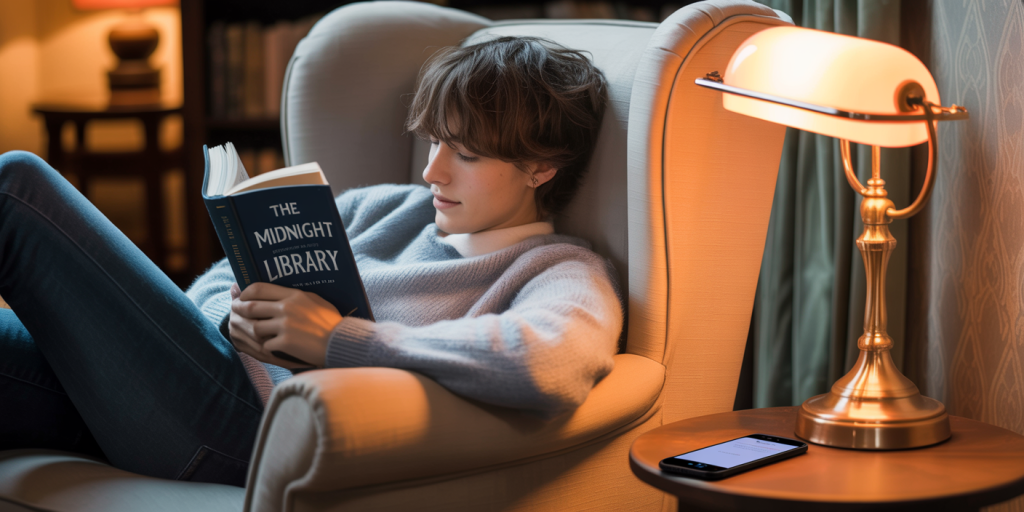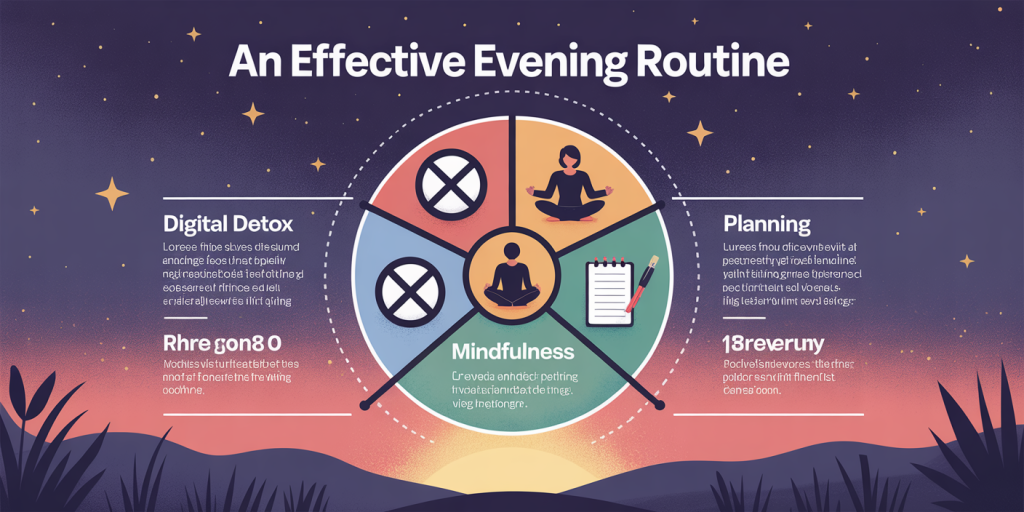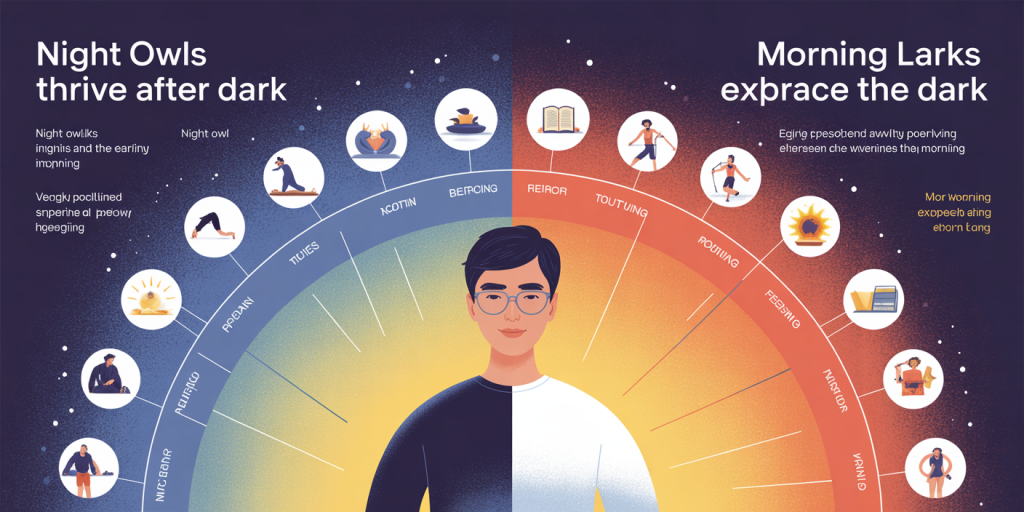The Power of Evening Routines (Even If You’re Not a Morning Person)
In a world that often glorifies early risers and morning productivity, many individuals shy away from the spotlight simply because mornings aren’t their forte. However, thriving in today’s demanding environment doesn’t necessitate a sunrise start. Instead, mastering the power of an effective evening routine can be a game-changer. Evening routines, when crafted wisely, harness the quieter moments of the day to set the stage for success, rejuvenation, and clarity.
Research from the National Sleep Foundation indicates that individuals with structured evening habits report 50% greater satisfaction with their sleep quality and daily functioning. This highlights the importance of winding down with purpose and planning for tomorrow during evening hours. Whether winding down from a hectic day or preparing for the challenges ahead, evening routines provide space for intentional pause and productivity.
Why Evening Routines Matter More for Night Owls
Not everyone has the biological makeup of a morning person. Circadian rhythms vary widely, with studies suggesting roughly 20% of the population identifies as “night owls”—preferring late-night activity over early mornings. For these individuals, expecting peak performance immediately after waking can be unrealistic and counterproductive.
Instead, literature emphasizes aligning daily habits with one’s natural chronotype. Evening routines, therefore, serve as crucial retrieval and reset points rather than rushed reflections of morning productivity. For example, renowned author Haruki Murakami, known for his nocturnal writing schedule, structures his evenings with careful reflection and preparation for the next day, ensuring mental clarity and sustained creativity.
Anúncios

Beyond personal energy management, evening routines have cognitive benefits. A 2019 study in the Journal of Sleep Research linked consistent bedtime routines with enhanced memory consolidation and reduced anxiety. By engaging in calming and organized activities at night, night owls can offset sleep inertia and improve mood upon waking.
Components of an Effective Evening Routine
Creating a successful evening routine revolves around blending relaxation, reflection, and preparation in ways that suit individual needs and lifestyles. Below are essential elements most evidence-based routines integrate.
1. Digital Detox and Light Exposure Management
Light exposure, especially from screens, affects the production of melatonin— the hormone responsible for sleep regulation. Experts recommend avoiding blue light exposure at least an hour before bedtime. This adjustment helps signal the brain to transition naturally toward rest.
Consider the case of a corporate employee who switched off devices 60 minutes before sleep and replaced screen time with reading printed material. This simple shift increased her sleep duration by an average of 45 minutes and significantly improved next-day alertness.
2. Mindfulness and Stress Reduction
Engaging in mindfulness practices like meditation, deep breathing, or journaling can alleviate stress accumulated throughout the day. These methods enable better emotional regulation and prepare the mind for restful sleep.
A study from the University of Massachusetts Medical School reports that patients participating in an eight-week mindfulness-based stress reduction program experienced a 30% reduction in insomnia symptoms. Introducing a 10-minute meditation session nightly can foster similar benefits.
3. Planning and Goal Setting
Evening routines often include reviewing accomplishments and planning priorities for the next day. This practice shifts mental clutter away from nighttime rumination and towards constructive problem-solving.
For example, entrepreneur Tim Ferriss advocates a “Not-To-Do List” written each night, helping him reduce decision fatigue and improve focus during working hours.
Anúncios
| Component | Purpose | Practical Tip |
|---|---|---|
| Digital Detox | Promotes melatonin production | Switch off devices 1 hour before bed |
| Mindfulness | Reduces stress and anxiety | Engage in guided meditation app |
| Planning & Reflection | Clears mental clutter | Write next day’s priorities |

Real-Life Success Stories Demonstrating Evening Routine Impact
People across various professions confirm that investing in evening routines leads to tangible improvements in productivity and well-being.
Case Study 1: Athlete Performance Optimization
Elite athletes rely heavily on recovery and mental preparation. Olympic swimmer Michael Phelps reportedly follows a strict pre-sleep routine involving stretching, visualization, and limiting exposure to stimulating activities. This regimen aids muscle relaxation and focuses the mind, contributing to his record-breaking performance.
A controlled study in the Journal of Sports Sciences found that athletes who adopted structured evening cooldowns and relaxation protocols improved sleep quality by 25%, correlating with enhanced next-day reaction times and decision-making.
Case Study 2: Creative Professionals and Evening Habits
A graphic designer named Sarah found that late-night creative surges often led her to sleep late and wake up exhausted. By instituting an evening routine that included a strict cutoff time for creative work, light stretching, and journaling about success moments, she improved her energy patterns. Six months into this practice, Sarah reported a 40% increase in creative output during work hours, attributing it to better-rested mornings and a clearer mind.
Evening vs. Morning Routines: Which Is More Effective for You?
While morning routines hold undeniable value for many, evening routines offer distinct advantages, especially for non-morning people. Below is a comparative analysis illustrating the unique benefits and challenges associated with each.
| Aspect | Morning Routines | Evening Routines |
|---|---|---|
| Peak Energy Alignment | Suits morning larks; may exhaust night owls | Aligns with natural peak or wind-down times |
| Stress Management | Sets tone but limited time for reflection | Better for calming day’s accumulated stress |
| Productivity Boost | Early tasks get prioritized | Prepares mindset and plan for following day |
| Sleep Impact | Can disrupt if wake time is unnatural | Enhances sleep quality via winding down |
| Flexibility | Less flexible; strict wake times required | Can be adapted based on evening energy levels |
From this table, it is evident evening routines present a flexible and often more effective approach for individuals whose rhythms and lifestyles do not conform to traditional early starts. The emphasis on calming, reflecting, and planning promotes healthier sleep patterns and cognitive readiness.

Practical Tips to Build and Maintain Your Evening Routine
Starting and sustaining an evening routine takes intentional effort. Below are practical strategies to create habits that last:
Consistency is Key Set a fixed window for beginning your routine each night. Consistency strengthens circadian cues and habit formation.
Personalize Your Activities Not everyone needs meditation; some may prefer reading, stretching, or even listening to calming music. Experiment to find what suits you best.
Limit Caffeine and Heavy Meals at Night Avoid stimulants and heavy foods within three hours of bedtime to facilitate digestion and sleep onset.
Prepare Your Sleep Environment Dim lights, cool room temperature (around 65°F or 18°C), and comfortable bedding improve sleep quality as supported by sleep hygiene studies.
Use Reminders and Accountability Set alarms, use journaling apps, or partner with a friend to encourage adherence.
Future Perspectives: The Evolving Role of Evening Routines in a 24/7 World
The digital age’s constant connectivity increasingly disrupts natural rhythms, posing new challenges for rest and recovery. Emerging technologies, however, are leveraging data to optimize evening routines. Smart lighting that mimics natural dusk and apps that track sleep patterns offer innovative ways to tailor wind-down practices dynamically.
Moreover, workplace cultures are gradually recognizing the value of asynchronous productivity, paving the way for flexible schedules that accommodate different chronotypes. Employers incorporating education on evening routine benefits notice reduced burnout and higher employee engagement.
On a societal level, the ongoing research into chronobiology promises more personalized healthcare strategies based on individual circadian profiles, making evening routines an integral part of holistic wellness plans.
For those who are not morning people, understanding and embracing the power of evening routines is more relevant than ever. Their transformative potential extends beyond just better sleep—it fosters mental clarity, resilience, and enhanced quality of life in all areas.
By prioritizing evening rituals aligned with personal rhythms, non-morning individuals can unlock productivity, health, and satisfaction without forcing unnatural habits. The power of evening routines lies in preparing not just for sleep but for waking up refreshed, alert, and ready to make the most of every day.
